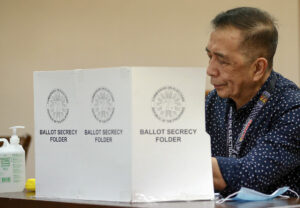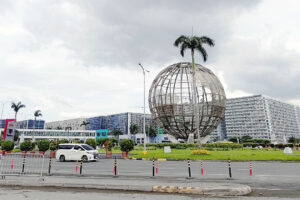More uncertainty?

It is clear that the bypassing of the confirmations of interim Commission on Elections (Comelec) Chairman Saidamen Balt Pangarungan and Comelec Commissioner George Garcia by the Commission on Appointments (CA) were politically motivated.
This was the response of former Senate President and Minority Floor Leader Franklin M. Drilon, when asked about the probable reasons for the bypassing of the confirmation of the two competent gentlemen from Comelec. We interacted with them during their short tenure at Comelec and we noted their forthrightness and approachability. A third commissioner, Aimee Torrefranca-Neri was also bypassed.
It is, however, perfectly clear and understandable that political appointments like Comelec chairman and Commissioners become…. well, political. It is important that the President of the Republic will have, at the very least, some access or influence, and with politics at its worst, control over his/her appointees in an independent Constitutional agency that manages and administers elections.
The bypassing of the confirmation of Pangarungan and Garcia was achieved simply by the House contingent of the CA not showing up. Their absence prevented the achievement of a quorum. There was therefore no basis for conducting further business.
One ally of Ferdinand Marcos, Jr. however said that it was only right to bypass the confirmation of the three remaining unconfirmed commissioners to give the incoming president “leeway” to get people of his choice and confidence. On the surface, one can say, there is nothing wrong with that, for as long as the power to appoint is used judiciously. Stakeholders have a fair idea of what Comelec needs to do to gain the trust of the people. Civil society groups know what expertise the poll body needs for it to address shortcomings that compromise transparency and being a truly rule-based agency.
The bypassing of the confirmation of Pangarungan and Garcia, further stresses the point that Marcos Jr., although an ally of Rodrigo Duterte and Sara Duterte, will make decisions to achieve his own objectives.
What are Marcos Jr.’s primordial objectives? He said it himself in a campaign interview: “to protect himself” and, most likely, his family, his family’s resources, his father’s legacy. And appointing his own people at the Comelec is ultimately in support of that objective.
Marcos Jr.’s oathtaking at the National Museum is also part of the fulfillment of that objective of promoting, protecting, and defending the legacy of Marcos Sr., whatever that may be in his and his millions of supporters’ eyes. It must be noted that the National Museum was the old Congress. Marcos Sr. started his political career as congressman of the second district of Ilocos Norte from 1949 to 1959 in that same building — which he locked up on Sept. 23, 1972 when he declared Martial Law. Marcos Sr. launched his presidential ambitions from the Senate after being elected Senator in 1959. By 1961, he wanted to be President and had attempted to wrest the Liberal Party nomination for President from then Vice-President Diosdado Macapagal. Marcos Jr. is merely retracing the footsteps of his father.
The formation of Marcos Jr.’s Cabinet, particularly with respect to the economic team, could also be said to follow the same path as Marcos Sr. Marcos Sr. appointed technocrat-academicians-corporate executives like Cesar Virata, Jr., Placido Mapa, Gerry Sicat, Jaime Laya, Vicente Paterno, Rafael Salas, and Alejandro Melchor, to name a few.
Marcos Jr. has recently announced the appointment of a number of Cabinet members who will form the economic team. All members of the economic team have spent time at the University of the Philippines (UP) School of Economics: former National Economic and Development Authority (NEDA) Director-General and Planning Secretary Felipe Medalla; Dr. Arsenio Balisacan, also a former NEDA Director-General and Planning Secretary; Benjamin Diokno, soon to vacate his position as Bangko Sentral ng Pilipinas Governor; and Alfredo Pascual, former President of the University of the Philippines, Secretary of the Department of Trade and Industry.
The scuttlebutt is that Marcos Jr. and his inner circle were in a bit of a panic mode to publicly announce his team of economic managers in light of the negative impact his then-forthcoming victory was having on the international financial market. JP Morgan had quickly downgraded the credit rating of the Philippines. There was a feeling of foreboding and general unease with what appeared to be a clear victory for a candidate who still had to reveal his plans. After all, it is not easy to erase the memories of Martial Law, despite the organized and well-funded efforts at historical revisionism and falsification. In addition, candidate Marcos Jr. snubbed all the Comelec-organized and sanctioned presidential debates, obviously in order to avoid embarrassing questions about Martial Law, his academic credentials, work record as an elected public official, and details of his program of “Unity.” In short, there was a black hole that remained unfilled and that was creating damaging uncertainty.
What made naming his economic team more urgent was that a congressional proclamation of his victory was imminent and to be proclaimed without names and faces of the economic team would further aggravate the uncertainty.
Speaking of uncertainty during this period, one reflects on veteran journalist Vergel Santos’ comment on “incoming press secretary Trixie Angeles’ announcement that she will accredit bloggers to cover Ferdinand Marcos Jr.’s presidency. The idea is dangerous. It tends to legitimize the false impression that bloggers are journalists, and as such, part of the institution that the democratic constitution assigns as the people’s watchdog on government — the press.”
Santos is emphatic, “Blogging is not journalism, not even in the loosest sense. It’s a cheap, individualistic, free-wheeling operation. One need not train for it, and anyone can go into it. It’s not unlike going on a soapbox and shooting one’s mouth off. Journalism, on the other hand, is both a profession and a trade, governed by both ethical and moral standards and rules of practice. Journalists are trained in certain disciplines and skills, and their works go through layer upon layer of specialist vetting — for truthfulness, not to mention technicalities of craft and law — before being put out there for all the public to see.”
Santos further emphasizes his point with a metaphor: “For a graphic distinction: Journalism is a piloted train; blogging is a runaway one.”
Santos ends with both a piece of advice and a warning: “Legit journalists must rethink their journalism. The new landscape does not favor them.”
More uncertainty?
Philip Ella Juico’s areas of interest include the protection and promotion of democracy, free markets, sustainable development, social responsibility and sports as a tool for social development. He obtained his doctorate in business at De La Salle University. Dr. Juico served as secretary of Agrarian Reform during the Corazon C. Aquino administration.




